
The men's épée was one of four fencing events on the Fencing at the 1908 Summer Olympics programme. The competition was held from 17 to 24 July 1908 at the Franco-British Exhibition fencing grounds. There were 85 competitors from 13 nations. Each nation could enter up to 12 fencers. The medals were swept by the French fencers, who also took the gold medal in the team épée event. Gaston Alibert was the gold medalist, with Alexandre Lippmann taking silver and Eugene Olivier bronze. Officially, it was the second consecutive medal sweep in the event, though two of the three "Cuban" fencers who medaled in 1904 were actually American.

The men's sabre was one of four fencing events on the Fencing at the 1908 Summer Olympics programme. The top two places were won by Hungarian fencers, who also took the gold medal in the team sabre event. Jenő Fuchs took the gold medal and Béla Zulawszky the silver. Bronze went to Bohemian Vilém Goppold von Lobsdorf. There were 76 competitors from 11 nations. Each nation could enter up to 12 fencers.
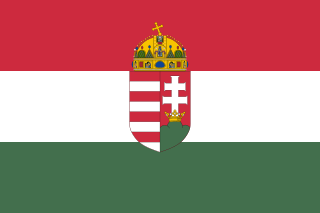
Hungary competed at the 1928 Summer Olympics in Amsterdam, Netherlands. 109 competitors, 93 men and 16 women, took part in 63 events in 12 sports.

The men's sabre was one of eight fencing events on the fencing at the 1964 Summer Olympics programme. It was the fifteenth appearance of the event. The competition was held from October 19 to 20, 1964. 52 fencers from 21 nations competed. Nations had been limited to three fencers each since 1928. The event was won by Tibor Pézsa, the final of nine straight Games in which a Hungarian fencer won the event. The silver medal went to Claude Arabo of France, with Umyar Mavlikhanov of the Soviet Union taking bronze.

The men's sabre was a fencing event held as part of the Fencing at the 1920 Summer Olympics programme. It was the sixth appearance of the event. A total of 43 fencers from 9 nations competed in the event, which was held on August 25 and August 26, 1920. Nations were limited to eight fencers each. The event was won by Nedo Nadi of Italy, one of his five gold medals in 1920. His brother Aldo Nadi took silver. Adrianus de Jong of the Netherlands finished third. They were the first medals in the individual men's sabre for both countries. This was the only time from 1908 to 1964 that Hungary did not win the men's sabre—with no Hungarian fencers competing after the nation was disinvited after World War I.

The men's sabre was one of seven fencing events on the Fencing at the 1924 Summer Olympics programme. It was the seventh appearance of the event, the only fencing event to have been on the programme at every Games. The competition was held from Tuesday July 16, 1924 to Thursday July 18, 1924. 47 fencers from 15 nations competed. Nations were limited to four fencers each, down from eight in 1920. The event was won by Sándor Pósta of Hungary, beginning a nine-Games streak in which Hungarians won the gold medal in the men's sabre. Roger Ducret of France took silver, while another Hungarian—János Garay—earned bronze.
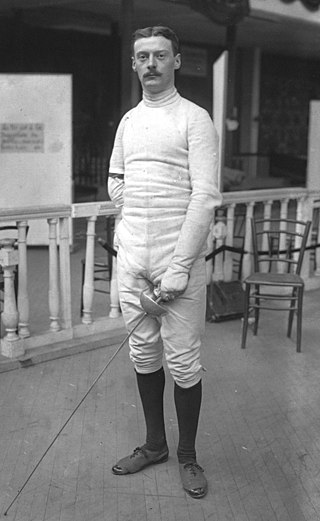
The men's épée was one of seven fencing events on the Fencing at the 1928 Summer Olympics programme. It was the seventh appearance of the event. The competition was held from 6 August 1928 to 7 August 1928. 59 fencers from 22 nations competed. Each nation could have up to three fencers. The event was won by Lucien Gaudin of France, the nation's third victory in the individual men's épée—taking sole possession of most among nations above Cuba and Belgium, each at two. Gaudin was the second man to win both the foil and épée events at a single Games. It was the third consecutive Games at which France reached the podium in the event. Two Frenchman had reached the head-to-head final; Gaudin won over Georges Buchard, who received silver. Bronze in 1928 went to American George Calnan, the nation's first medal in the event.

The men's foil was one of seven fencing events on the Fencing at the 1928 Summer Olympics programme. It was the seventh appearance of the event. The competition was held from 31 July 1928 to 1 August 1928. 54 fencers from 22 nations competed. For the third straight Games, the limit of fencers per nation was reduced. The event was won by Lucien Gaudin of France, the nation's second consecutive and fourth overall victory in the men's foil. Erwin Casmir earned silver to give Germany its first medal in the event. Giulio Gaudini of Italy took bronze.
The men's team sabre was one of seven fencing events on the Fencing at the 1928 Summer Olympics programme. It was the fifth appearance of the event. The competition was held from 8 August 1928 to 9 August 1928. 65 fencers from 12 nations competed.
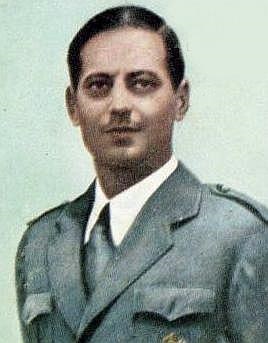
The men's épée was one of seven fencing events on the fencing at the 1932 Summer Olympics programme. It was the eighth appearance of the event. The competition was held from 8 August 1932 to 9 August 1932. 28 fencers from 12 nations competed, with three others entered but not starting. A maximum of three fencers per nation could compete. The event was won by Giancarlo Cornaggia-Medici of Italy, with his countryman Carlo Agostoni taking bronze. They were the first medals for Italy in the men's individual épée. France reached the podium for the fourth consecutive Games in the event with Georges Buchard's silver. Buchard was the third man to win multiple medals in the event, repeating his second-place finish from 1928.

The men's foil was one of seven fencing events on the fencing at the 1932 Summer Olympics programme. It was the eighth appearance of the event. The competition was held from 2 to 4 August 1932. 26 fencers from 12 nations competed, with one other entered but not starting. Each nation was limited to three fencers. The event was won by Gustavo Marzi of Italy, the nation's third victory in the men's foil. His countryman Giulio Gaudini took bronze for the second consecutive Games, becoming the fourth man to win multiple medals in the event. Joe Levis gave the United States its first men's foil medal with his silver.

The men's sabre was one of seven fencing events on the fencing at the 1932 Summer Olympics programme. It was the ninth appearance of the event. The competition was held from 12 August 1932 to 13 August 1932. 25 fencers from 12 nations competed. Five additional fencers entered but did not start. Each nation was limited to three fencers. The event was won by György Piller of Hungary, the third of nine straight Games in which a Hungarian would win the event. Giulio Gaudini of Italy took silver, while another Hungarian earned bronze.

The men's sabre was one of seven fencing events on the fencing at the 1936 Summer Olympics programme. It was the tenth appearance of the event. The competition was held from 14 August 1936 to 15 August 1936. 71 fencers from 26 nations competed. Nations were limited to three fencers each. The event was won by Endre Kabos of Hungary, the fourth of nine straight Games in which a Hungarian would win the event. Kabos became the second man to win multiple medals in the individual sabre, adding to his 1932 bronze. Gustavo Marzi of Italy took silver, while Hungarian Aladár Gerevich earned bronze.

The men's sabre was one of seven fencing events on the fencing at the 1948 Summer Olympics programme. It was the eleventh appearance of the event. The competition was held from 12 August 1948 to 13 August 1948. 60 fencers from 24 nations competed. Nations were limited to three fencers each. The event was won by Aladár Gerevich, the fifth of nine straight Games in which a Hungarian would win the event. Gerevich became the third man to win multiple medals in the individual sabre, adding to his 1936 bronze. Vincenzo Pinton of Italy took silver and Pál Kovács of Hungary took bronze; it was the third straight Games where the sabre podium was Hungary-Italy-Hungary.

The men's sabre was one of seven fencing events on the fencing at the 1952 Summer Olympics programme. It was the twelfth appearance of the event. The competition was held from 31 July 1952 to 1 August 1952. 66 fencers from 26 nations competed. Nations were limited to three fencers each. The event was won by Pál Kovács, the sixth of nine straight Games in which a Hungarian would win the event. Kovács became the fourth man to win multiple medals in the individual sabre, adding to his 1948 bronze. Hungary swept the medals in the event for the second time. Aladár Gerevich's silver completed a set of three different color medals in the event, the first man to win three medals in individual sabre. Tibor Berczelly earned bronze.
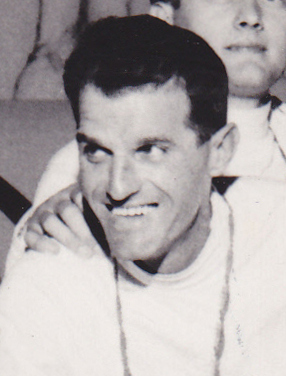
The men's sabre was one of seven fencing events on the fencing at the 1956 Summer Olympics programme. It was the thirteenth appearance of the event. The competition was held on 5 December 1956. 35 fencers from 17 nations competed. Nations had been limited to three fencers each since 1928. The event was won by Rudolf Kárpáti, the seventh of nine straight Games in which a Hungarian would win the event. Jerzy Pawłowski of Poland took silver and Lev Kuznetsov of the Soviet Union took bronze, the first medals in the event for each nation and the first time since 1924 that any nation other than Hungary and Italy earned a medal in the men's sabre.

The men's sabre was one of eight fencing events on the fencing at the 1960 Summer Olympics programme. It was the fourteenth appearance of the event. The competition was held from 7 to 8 September 1960. 70 fencers from 29 nations competed. Nations had been limited to three fencers each since 1928. The event was won by Rudolf Kárpáti, the eighth of nine straight Games in which a Hungarian would win the event. Kárpáti was the second man to successfully defend an Olympic title in the men's sabre and fifth to win multiple medals of any color. His teammate Zoltán Horváth took silver while Wladimiro Calarese of Italy finished with the bronze.
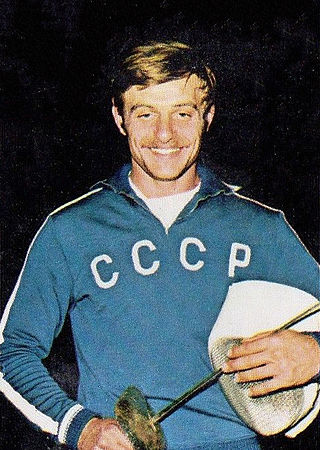
The men's sabre was one of eight fencing events on the fencing at the 1972 Summer Olympics programme. It was the seventeenth appearance of the event. The competition was held from 30 to 31 August 1972. 53 fencers from 22 nations competed. Nations had been limited to three fencers each since 1928. The event was won by Viktor Sidyak of the Soviet Union, the nation's first victory in the event. Hungary had lost its nine-Games gold medal streak in 1968 but remained a power in the event; Péter Marót took silver to extend Hungary's podium streak to 11 Games. Another Soviet, Vladimir Nazlymov, earned bronze.
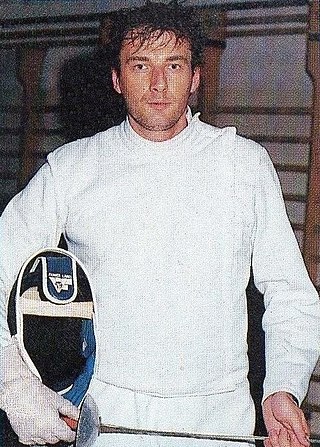
The men's sabre was one of eight fencing events on the fencing at the 1984 Summer Olympics programme. It was the twentieth appearance of the event. The competition was held from August 3 to 4, 1984. 33 fencers from 16 nations competed. Nations had been limited to three fencers each since 1928. The event was won by Jean-François Lamour of France, the nation's first victory in the event since 1900. Marco Marin of Italy took silver and Peter Westbrook of the United States took bronze. It was the first medal in the event in many Games for each of the three nations since 1964 for France, since 1960 for Italy, and since 1904 for the United States), as the men's sabre competitions had been dominated by Hungary and the Soviet Union. With both of those nations boycotting the 1984 Games, other nations had an opportunity to win medals in the sabre.

The men's sabre was one of eight fencing events on the fencing at the 1988 Summer Olympics programme. It was the twenty-first appearance of the event. The competition was held from 22 to 23 September 1988. 40 fencers from 18 nations competed. Nations had been limited to three fencers each since 1928. The event was won by defending champion Jean-François Lamour of France, the fourth man to successfully defend an Olympic title in the sabre and the 11th man overall to win multiple medals in the event. It was France's third victory in the event, matching the Soviet Union for second-most all-time. Janusz Olech took silver, Poland's first medal in the event since 1968. Italian Giovanni Scalzo earned bronze.


















